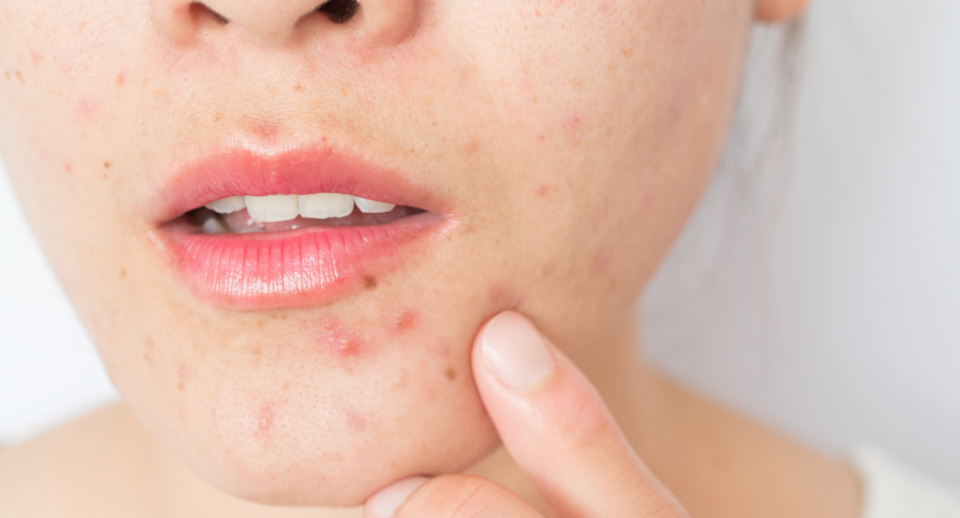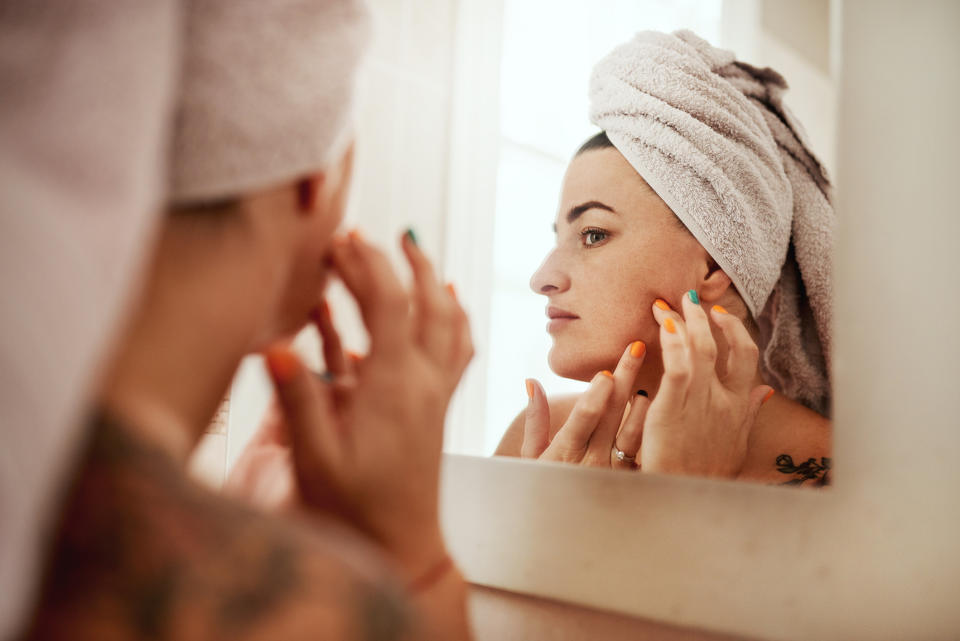Here's why more people are turning to therapy to treat their chronic acne
Looking for more news on health and wellness? Sign up for Yahoo Lifestyle Canada’s newsletter!

I was never one to worry about my skin. While I went through the common hormonal zit phase in high school, it was never a cause for concern and cleared up on its own before graduation. Even throughout university, wearing foundation was a foreign concept and I only used moisturizer during the winter (I cringed while writing that out, too). But once I graduated from my journalism program and was thrown into this highly-competitive and unstable industry, something changed. It started off as one spot and seemed to multiply every night.
After a few months, my cheeks were covered in big, red, painful pimples and I couldn’t understand why. I tried changing my diet, buying expensive products and even stopped wearing makeup, which really didn’t help my self esteem - but nothing seemed to work. And then, the pandemic hit.
I had expected my skin to worsen over those few months, but each day it seemed to clear up more and more on its own. The combination of no longer having my daily commute or stressful situations at work, in addition to getting more sleep and more time with my family was apparently all my skin needed. That’s when I realized that my skin issues had more to do with my mind than my actual skin itself. Although it took me way too long to realize that my acne was triggered by stress and anxiety from both external and internal causes, the connection between skin and mental health is by no means a new concept.

Psychodermatology is the treatment of skin disorders such as acne, eczema, rosacea and psoriasis using psychological and psychiatric techniques. The field focuses on the collaboration between the fields of psychology and dermatology and consists of both psychologists who have developed an expertise in dermatology and conversely, dermatologists with a background in psychology.
Dr. Alia Ahmed is a U.K.-based psychodermatologist who studied psychology prior to graduating from the Royal London School of Medicine in 2008. Upon graduation, Ahmed applied for dermatology training and now works as a consultant for both the Frimley and Barts National Health Services Trusts. According to Ahmed, whenever we feel stressed, our body activates our hypothalamic pituitary adrenal (HPA) axis, our central stress response system that lives in our brain, and releases the stress hormone, cortisol. Cortisol weakens your skin’s immune system, making it more difficult to fend off acne-causing bacteria while also increasing the production of sebum, an acne-causing oil on your skin.
ALSO SEE: How pregnancy made me fall in love with my body again
In an interview with Yahoo Canada, Ahmed revealed she has always had a fascination with the dangerous cycle of how stress can trigger chronic skin conditions such as acne, and how acne can also trigger other mental health issues.
“When you have minor acne, it starts to become stressful once you worry about what others are thinking and when they start making comments or observations about it. This stress can drive up your body’s inflammatory process, which leads to you producing more oil, which is one of the factors that makes you get acne in the first place,” Ahmed explained. “And that makes you feel even worse because your acne has gotten worse, and it just keeps going around and around unless someone can break into that pattern and treat your acne effectively- but also make you feel better about it.”

Alex Boyd, 27, is currently at the tail-end of her program at the Institute of Holistic Nutrition in Vancouver, but it was a long, winding journey for her to find her passion and feel at peace. Boyd had originally studied photography, but after working for a larger corporation, she decided to pursue public relations at Ryerson University in Toronto. While juggling all of these different responsibilities and living on her own, she found herself in a deep depression between the years of 2014 to 2017.
“Sometimes I think we forget how many layers of stress that can be added on to our bodies,” Boyd told Yahoo Canada. “Internally, I was dealing with all of these emotions and these heavy feelings, but externally, everyone thought I was like this bubbly, happy-go-lucky human being.”
ALSO SEE: Need to heal a sunburn fast? We asked an expert for her tips
This stress caused Boyd to develop deep and painful hormonal cystic acne. As she started to deal with her internal and emotional issues directly, Boyd saw a major improvement in her complexion, which she didn’t think was possible. She improved her diet and began journaling to help process her emotions.
“I started taking care of myself again,” Boyd said, adding that she let go of toxic or damaging relationships and extra stress, and shifted the way she thought about herself.

Self-compassion, acceptance and managing your emotions are three, big pillars when treating acne through psychodermatology.
Dr. Jen Newell, a Toronto-based naturopathic doctor and skin health expert, is passionate about helping women overcome acne and other skin disorders and bodily imbalances through a more holistic approach. Newell said it was her own struggle with hormonal cystic acne and mild rosacea for over 10 years that inspired her to help others. In her more than a decade long journey, Newell felt dissatisfied with conventional treatments, and decided to seek her own.
ALSO SEE: 'Representation matters': Magazine's latest cover praised for 'gorgeous' portrayal of motherhood
Newell doesn’t have a cookie-cutter treatment plan when she’s working with her patients. Instead, she spends up to two hours with patients discussing their concerns, lifestyle and anything else that comes to mind, in order to create a fully customized treatment plan, which she believes has a better chance of being successful. From nutritional changes to natural supplements and relaxing activities, Newell likes to empower her patients by working with them to create the best plan possible.
“One of the most important questions I ask my patients is, ‘What do you do for fun and how do you manage stress?’ That’s a huge piece of the puzzle and is different for everyone,” Newell said. “For example, journaling is not my thing. I also don’t enjoy meditation. But I’ve found other activities that are really useful. So, we can play a little bit of an adventure game to figure out what will work best for them.”
Interestingly, Newell told Yahoo Canada that she often tells her patients not to be too rigid with dietary or activity plans. Although it’s well-known that sugar and dairy can contribute to your acne, Newell said if her client is experiencing a severe amount of stress and anxiety, a scoop of ice cream won’t be the end of the world. In fact, it may even put them at ease, which in the long term will help heal their skin. While she notes that it is still important to keep an eye on unhealthy habits, she also said it’s important for her to be as open minded as possible and really listen to patients—they know their body better than anyone.

Christina Tucci first started noticing acne on the sides of her face while she was working at the Toronto International Film Festival in 2018. The 24-year-old initially assumed it was due to wearing shared headsets with the rest of the staff, but when the acne spread to her cheeks and grew deeper and more painful, she knew something was off.
After Tucci’s naturopathic doctor suggested she get tested for a hormonal imbalance, she spent nearly a year enduring blood tests, each one requiring 12 vials of blood, and countless scans—but everything kept coming back fairly normal. While a few of her hormone levels would occasionally spike, she noticed that they would level off when her anxiety would lessen.
ALSO SEE: 'Signal for help' campaign aims to assist abuse victims in quarantine
“All of these tests kept coming back negative, as if I was a perfectly healthy person and there was no physical reason for this to be happening,” Tucci said. “After all of that, we concluded that the only explanation for this was that my anxiety had just gotten to be so bad that it had messed up the way my body functioned.”
Tucci noticed that the emotionally and physically draining tests were causing her anxiety to increase. As a result, she reached her peak in March of 2019. While she wanted to seek out therapy, Tucci said it was difficult to find effective resources that were covered by the Ontario Health Insurance Plan (OHIP). She decided to help herself by changing her lifestyle through yoga, anxiety-reducing medication, and by adopting a dairy-free diet.
Overall, both Ahmed and Newell emphasized the importance of different medical specialists working together with their patient. Both say collaboration is key and that it’s the only way psychodermatology can continue to build its name and reputation in the medicinal community.

“In psychoderm, we like to work in teams, so I can refer my patient to my psychologist and explain that they’ll be working with them as well, and we’ll all be working together to fix the issue,” said Ahmed. While she is also able to provide basic therapy, she explained it’s always a bonus to seek expertise from a specialist who can help patients with Cognitive Behavioural Therapy and other mindfulness-based practices. “It just creates that stability for the patient rather than making them feel as if they’re being left behind and flocked to someone else. We all just need to help each other.”
In terms of ending the stigma surrounding the field, naturopathy and other holistic approaches, Newell said it can only be achieved if doctors from different specialties learn more about other practices and treatment styles.
“Many MDs that I'm colleagues or friends with express that they just haven't had the opportunity to go through more holistic research, or they're essentially discouraged from thinking a little bit outside the box,” said Newell. “When we see that collaboration, we have the ability to get a little creative, which is the unique piece of what we do. And I think that’s when we can provide really exceptional care.”
Let us know what you think by commenting below and tweeting @YahooStyleCA! Follow us on Twitter and Instagram and sign up for our newsletter.


